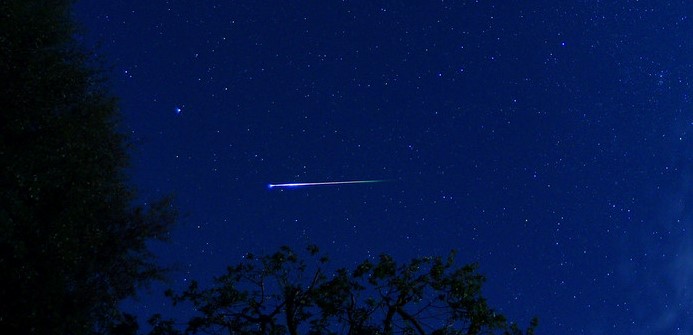
Last winter I was staying with friends who have a dark sky. (I don’t have a dark sky and even on clear nights I can hardly see Orion, which makes me sad but I’m used to it.) It was New Year’s Eve and as usual I bugged out early, went up to the guestroom, adjusted the blinds so that lying in bed I could see the sky, went to sleep. Fireworks at midnight, woke up, looked at the sky, watched the sparkles for a while, rolled over and went back to sleep. A couple hours later, my brain woke me up so it could look at the dark sky some more. I rolled back over, looked through the blinds at the sky, and there, sliding fast and exactly between the slats was a shining and glorious little meteor. Oh my! I thought. Oh my goodness gracious sakes alive! What an excellently superb way to start the new year, I thought.
I wondered whether my meteor was part of a shower. I didn’t know of any, though I looked it up later and maybe it was one of the Quadrantids, also maybe not. Anyway, I rolled over again, went back to sleep. But my brain had gotten obsessed with the sky and wasn’t about to give it up.
So I kept rolling over, looking, then rolling back over and going to sleep, then rolling over again, looking again and again. No more meteors. But the stars were so bright, one in particular which was maybe Arcturus or maybe Polaris, which in either case I thought was Venus because I wasn’t used to stars being so bright (Baltimore’s fault). Every time I woke up those bright stars were still there the way stars always are, always there.

Later, though, one time I woke up and looked again and the bright stars weren’t there. It must have clouded over, I thought. So I looked for clouds; no clouds. Then what happened? did something go wrong? Then I remembered that the earth turns, so the bright stars weren’t there because they had rotated behind the trees. Oh ha ha, I thought, silly you, forgetting that you should never second-guess the sky.
Which reminds me of the time years ago I got up in the middle of the night to look for an eclipse of the moon, the earth’s shadow crawling across the moon, turning it blood red. I looked out the window, no blood moon. The eclipse must be delayed, I thought, it must be running late. Then I remembered that eclipses don’t do that, eclipses are punctual, reliable, completely trustworthy. So I checked the clock again and yes, of course, I was wrong about the time. Don’t second-guess an eclipse either.
I love the mistake my brain was making — predicting the sky based on human norms. Second-guessing human events is fine, smart, a survival strategy: people are mistaken, things get delayed, situations get screwed up. When something is unexpected, isn’t going according to plan, look first for what went wrong. Our current combination of wired-in racism and a raging pandemic is a fine example, and the list of things that went wrong and are still going wrong must be setting some kind of historical world record for human fuck-ups.
For the universe, though, the standard operating procedure is order. The universe doesn’t go wrong. Even the change is orderly: the meteor follows the orbit of its disintegrated parent, Betelgeuse gets fainter and then brightens again. The universe operates lawfully on mostly-known physics.
I do love it when things that are so obvious and logical, things as widely-known as Newton’s laws, turn out to be a surprise. I love it even more when the universe continues to opt for order.
___________
Meteor, slightly cropped, by Tom Lee, via Flickr; Night sky, cropped, by Mathias Krumbholz via Wikimedia Commons;
You’ll be forgiven, due to sleep induced fuzziness, for thinking that Venus and Polaris would ever share a small patch of sky, such as might be visible out a bedroom window.
Was just rereading the post and wondering the same thing. Thank you, and I will correct my fuzzy sleep-mind accordingly.
Glad to hear Betelgeuse is up and running. It went behind the night horizon, out of sight, out of mind. Three cheers for regularity!